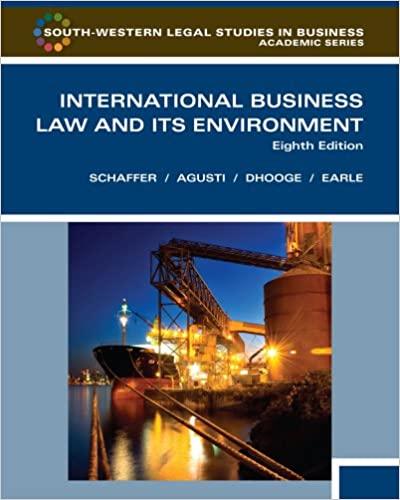Question
Case 11.1 Rubin v. Islamic Republic of Iran Supreme Court of the United States, __ U.S. __, 138 S.Ct. 816, __ L.Ed.2d __ (2018). BACKGROUND
Case 11.1 Rubin v. Islamic Republic of Iran
Supreme Court of the United States, __ U.S. __, 138 S.Ct. 816, __ L.Ed.2d __ (2018).
BACKGROUND AND FACTS Hamas, a terrorist organization sponsored by the Islamic Republic of Iran, carried out three suicide bombings in Jerusalem, causing the deaths of five people and injuring nearly two hundred others. Jenny Rubin and other U.S. citizens who were injured or related to those injured obtained a judgment under Section 1605A of the Foreign Sovereign Immunities Act (FSIA) against Iran for $71.5 million in damages.
To collect on the judgment, the plaintiffs sued Iran in a federal district court under Section 1610(g) of the FSIA. The plaintiffs sought to attach and execute against a collection of ancient art owned by Iran that was being housed at the University of Chicago. Attachment and execution is the legal process of seizing property to ensure payment of a debt. The property of a foreign sovereign is typically immune to attachment and execution, and the court explained that Section 1610(g), in and of itself, provided no basis for bypassing this immunity. The court ruled in the defendant's favor, and the plaintiffs appealed. The U.S. Court of Appeals for the Seventh Circuit affirmed. The plaintiffs then petitioned the United States Supreme Court.
In the Language of the Court
Justice SOTOMAYOR delivered the opinion of the Court.
* * * *
* * * Section 1610(g) provides: * * * "The property of a foreign state against which a judgment is entered under Section 1605A * * * is subject to attachment in aid of execution, and execution, upon that judgment as provided in this section."
* * * The issue at hand is whether Section 1610(g) * * * allows a Section 1605A judgment holder to attach and execute against any property of the foreign state.
* * * *
* * * The most natural reading is that "this section" refers to Section 1610 as a whole, so that Section 1610(g) will govern the attachment and execution of property that is exempted from the grant of immunity as provided elsewhere in Section 1610.
Other provisions of Section 1610 unambiguously revoke the immunity of property of a foreign state, including specifically where a plaintiff holds a judgment under Section 1605A, provided certain express conditions are satisfied. For example, [Section 1610(a)] provides that "property in the United States * * * used for a commercial activity in the United States * * * shall not be immune" from attachment and execution in seven enumerated circumstances * * * . [Section 1610(b), (d), (e), and (f )] similarly set out circumstances in which certain property of a foreign state "shall not be immune."
Section 1610(g) conspicuously lacks the textual markers, "shall not be immune" or "notwithstanding any other provision of law," that would have shown that it serves as an independent avenue for abrogation [abolition] of immunity. In fact, its use of the phrase "as provided in this section" signals the opposite: A judgment holder seeking to take advantage of Section 1610(g) must identify a basis under one of Section 1610's express immunity-abrogating provisions to attach and execute against a relevant property. [Emphasis added.]
* * * *
Throughout the FSIA, special avenues of relief to victims of terrorism exist * * * . Where the FSIA goes so far as to divest a foreign state or property of immunity in relation to terrorism-related judgments, however, it does so expressly. Out of respect for the delicate balance that Congress struck in enacting the FSIA, we decline to read into the statute a blanket abrogation of attachment and execution immunity for Section 1605A judgment holders absent a clearer indication of Congress's intent.
Decision and Remedy
The United States Supreme Court concluded that Section 1610(g) does not provide "a freestanding basis for parties holding a judgment under Section 1605A to attach and execute against the property of a foreign state, where the immunity of the property is not otherwise rescinded under a separate provision within Section 1610." The Court affirmed the judgment of the federal appellate court.
task:
Prepare Case Brief for Rubin v. Islamic Republic of Iran !
(must include facts, Issue, Rule, Application and conclusion)
Step by Step Solution
There are 3 Steps involved in it
Step: 1

Get Instant Access to Expert-Tailored Solutions
See step-by-step solutions with expert insights and AI powered tools for academic success
Step: 2

Step: 3

Ace Your Homework with AI
Get the answers you need in no time with our AI-driven, step-by-step assistance
Get Started


